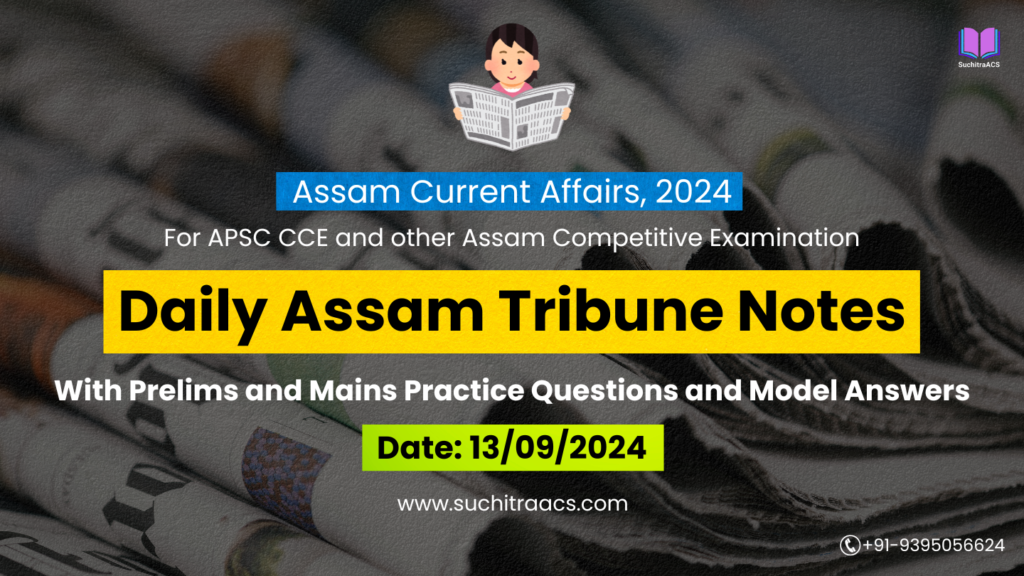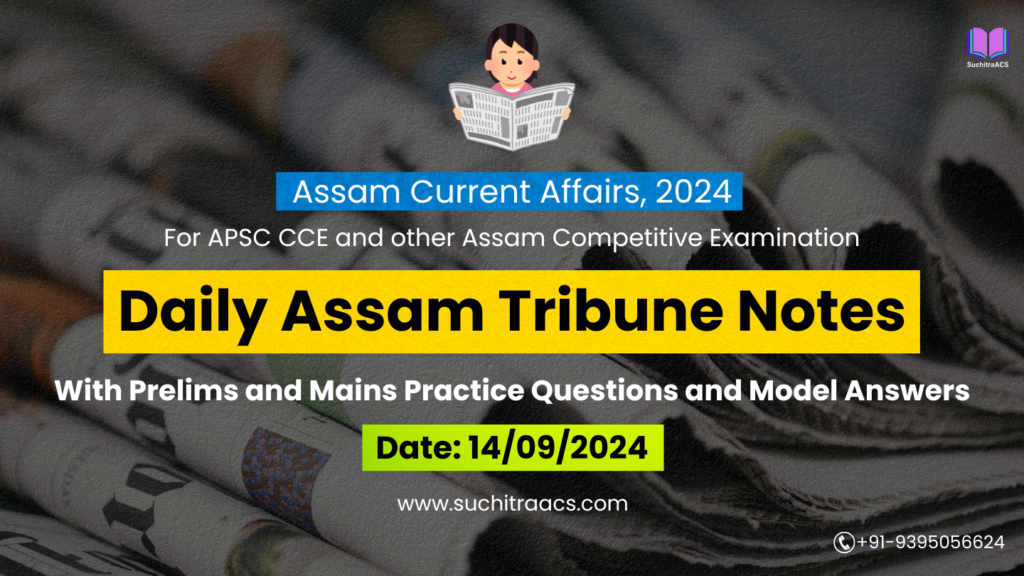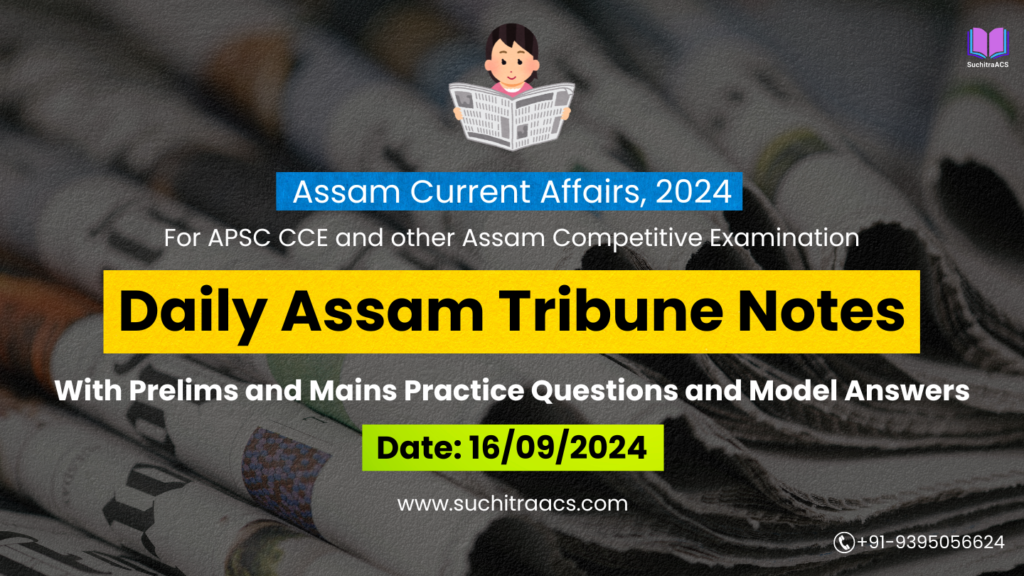1. Assam’s Free Foodgrains Initiative under NFSA
GS Paper II – Governance, Social Justice
Introduction:
The Assam government has launched an initiative to provide free foodgrains to over 2.5 crore people under the National Food Security Act (NFSA), covering around 68% of the state’s population. This move aims to improve food security, especially for vulnerable sections of society.
Key Points:
- Target Beneficiaries: Over 2.31 crore beneficiaries are currently enrolled, with an additional 42 lakh individuals added in 2024.
- Anna Sewa Din: Food distribution takes place from the 1st to the 10th of every month, streamlining the process and ensuring timely delivery.
- Inclusive Approach: The initiative focuses on enrolling those excluded due to issues with Aadhaar or NRC biometric locks, ensuring that marginalized groups are not left out.
- Doorstep Delivery: Special provisions are made for Divyangjans (differently-abled individuals) to receive foodgrains at their homes.
Prelims Focus:
- NFSA-13: The law provides subsidized foodgrains for eligible citizens.
- Anna Sewa Din: Key initiative for regular distribution of foodgrains.
- Vulnerable Sections: Special focus on ensuring marginalized communities are not excluded due to documentation issues.
Mains Focus:
- Food Security in Assam:
- Challenges:
- Inclusion Errors: Ensuring all eligible individuals are enrolled.
- Logistics: Efficient distribution across remote areas.
- Awareness: Educating beneficiaries about their rights.
- Measures:
- Anna Sewa Din: Regular and timely foodgrain distribution.
- Awareness Campaigns: Informing people of their entitlements.
- Technological Solutions: Streamlining enrollment and distribution using technology.
- Challenges:
- Governance and Public Welfare:
- Proper Enrollment: Ensuring all eligible individuals are covered.
- Documentation Issues: Addressing Aadhaar and NRC-related exclusions to ensure inclusivity.
- Social Inclusion:
- Strategies:
- Community Outreach: Identifying and enrolling excluded individuals through community involvement.
- Grievance Redressal: Implementing systems to resolve complaints and issues faced by beneficiaries.
- Strategies:
Conclusion:
The free foodgrains initiative under NFSA is critical for ensuring food security in Assam. By addressing inclusion challenges and improving distribution efficiency, the state government aims to reduce hunger and provide relief to vulnerable populations.
2. Rainfall Deficit and Drought-Like Situation in Assam
GS Paper I & III – Geography, Disaster Management
Introduction:
In September 2024, Assam faced a rainfall deficit of 48%, causing a drought-like situation. This deficit had significant implications for agriculture and water availability, with rainfall recorded at 141.8 mm compared to the normal 272 mm.
Key Points:
- Initial Rainfall Deficit: Rainfall was as low as minus 62% by September 22.
- Improved Conditions: Increased rains towards the end of September reduced the deficit to 48%.
- Monsoon Deficit: Overall monsoon deficit from June to September was minus 19%.
- IMD Forecast: Further heavy rainfall was expected in early October, which helped alleviate drought conditions.
Prelims Focus:
- Rainfall Statistics: Key data on rainfall patterns in Assam.
- IMD Forecast: Role of the Indian Meteorological Department in weather forecasting and early warnings.
Mains Focus:
- Impact on Agriculture:
- Challenges:
- Crop Failure: Low rainfall affects the agricultural output.
- Water Scarcity: Reduced water availability impacts agriculture and daily life.
- Measures:
- Irrigation Projects: Focus on improving irrigation infrastructure.
- Drought-Resistant Crops: Promotion of crops resilient to dry conditions.
- Challenges:
- Disaster Preparedness:
- Proactive Measures:
- Early Warning Systems: Alerts for farmers and communities regarding droughts.
- Contingency Plans: Managing water resources during dry periods.
- Proactive Measures:
- Climate Resilience:
- Strategies:
- Climate-Resilient Agriculture: Adoption of crop diversification and soil conservation techniques.
- Sustainable Water Management: Ensuring long-term water availability through efficient management practices.
- Strategies:
Conclusion:
The rainfall deficit in Assam in 2024 underscores the need for proactive disaster preparedness and climate-resilient agriculture. Long-term strategies must focus on sustainable water management and supporting farmers to mitigate the impact of erratic rainfall.
3. Assam Direct Recruitment Examination (ADRE) and Internet Suspension
GS Paper II – Governance, Public Administration
Introduction:
The Assam Direct Recruitment Examination (ADRE) saw over 7.34 lakh candidates appearing for government posts across the state. To ensure the integrity of the examination process, the government implemented strict security measures, including an eight-hour internet suspension.
Key Points:
- Large-Scale Recruitment: The exam aimed to fill various Grade-III and HSLC-level posts, highlighting the demand for government jobs in Assam.
- Security Measures: Mobile internet services were suspended for eight hours to prevent malpractices, ensuring a transparent examination process.
- Employment Impact: The recruitment drive is expected to address unemployment and improve public sector efficiency in Assam.
Prelims Focus:
- Assam Direct Recruitment Examination (ADRE): Details of the recruitment process and scale.
- Internet Suspension: A security measure to prevent cheating during public examinations.
Mains Focus:
- Governance and Recruitment:
- Importance:
- Transparency: Ensuring a fair and transparent recruitment process builds public trust.
- Efficiency: Filling vacancies promptly improves the functioning of government departments.
- Examples:
- Security Measures: Rigorous protocols such as internet suspension prevent malpractices.
- Merit-Based Selection: Ensuring that the most qualified candidates are selected.
- Importance:
- Digital Rights vs Security:
- Impact:
- Civil Liberties: Internet suspensions affect access to information and daily life.
- Security: Such measures are necessary for maintaining the integrity of examinations.
- Examples:
- Balancing Act: Governments must balance security needs with the protection of digital rights.
- Alternative Solutions: Exploring non-invasive measures to prevent cheating.
- Impact:
- Unemployment:
- Impact:
- Job Creation: Recruitment drives help tackle unemployment rates in the state.
- Economic Stability: Government jobs provide financial security to individuals and their families.
- Examples:
- ADRE: The recruitment drive fills numerous public sector positions, addressing unemployment.
- Skill Development: Encouraging candidates to participate in skill development programs.
- Impact:
Conclusion:
The Assam Direct Recruitment Examination (ADRE) is a significant step toward addressing unemployment and improving public administration. While internet suspensions have raised concerns, they have ensured a secure and fair examination process.
4. Green Bodoland Mission: A Workshop on Climate Resilience
GS Paper III – Environment, Agriculture, Climate Change
Introduction:
The Green Bodoland Mission workshop, held in September 2024, focused on natural farming, afforestation, and achieving net-zero emissions. The workshop aimed to educate participants on sustainable agricultural practices and strategies for environmental conservation in Bodoland.
Key Points:
- Natural Farming: Promoting climate-resilient agricultural practices, such as organic farming and crop rotation.
- Afforestation: Reforestation efforts to enhance biodiversity and mitigate climate change through carbon sequestration.
- Net-Zero Emissions: Strategies to transition to net-zero emissions through renewable energy adoption and energy efficiency projects.
Prelims Focus:
- Green Bodoland Mission: Key objectives of promoting sustainable agriculture and environmental conservation.
- Natural Farming: Eco-friendly practices to reduce carbon emissions and enhance soil health.
- Net-Zero Emissions: Focus on reducing carbon footprints and achieving environmental sustainability.
Mains Focus:
- Sustainable Agriculture:
- Role:
- Climate Resilience: Natural farming improves soil health and reduces dependency on chemical inputs.
- Biodiversity: Diverse cropping systems enhance ecosystem stability.
- Examples:
- Organic Farming: Using organic fertilizers and pesticides to maintain soil fertility.
- Agroforestry: Incorporating trees into agricultural landscapes to improve biodiversity.
- Role:
- Afforestation and Carbon Sequestration:
- Contribution:
- Carbon Sequestration: Trees absorb CO₂, helping mitigate climate change.
- Biodiversity: Afforestation improves local biodiversity and provides habitats for wildlife.
- Examples:
- Reforestation Projects: Planting native tree species to restore degraded lands.
- Community Involvement: Engaging local communities in afforestation initiatives.
- Contribution:
- Transition to Net-Zero:
- Challenges:
- Infrastructure: Developing infrastructure for renewable energy projects.
- Funding: Securing financial resources for large-scale environmental projects.
- Strategies:
- Renewable Energy: Investment in solar, wind, and other renewable sources.
- Policy Support: Implementing policies that encourage sustainable practices and reduce emissions.
- Challenges:
Conclusion:
The Green Bodoland Mission is a crucial step in promoting sustainable agriculture and climate resilience in Assam. By focusing on natural farming and afforestation, the initiative aims to support environmental conservation and contribute to Assam’s transition to net-zero emissions.
5. Ayushman Bharat for Senior Citizens Aged 70+
GS Paper II – Governance, Health
Introduction:
The Union Health Ministry has expanded the Ayushman Bharat Health Insurance Scheme to cover senior citizens aged 70 years and above, ensuring that the elderly, often more vulnerable to health issues, receive necessary medical care.
Key Points:
- Eligibility Expansion: Senior citizens aged 70+ are eligible for health coverage under Ayushman Bharat, irrespective of socio-economic status.
- Ayushman Card: Each senior citizen receives a unique Ayushman card for easy access to healthcare services.
- Cashless Treatment: The scheme offers cashless treatment at empaneled hospitals for beneficiaries.
Prelims Focus:
- Ayushman Bharat Health Insurance Scheme: Key provisions and coverage details.
- Eligibility for Senior Citizens: Criteria and benefits for elderly individuals under the scheme.
- Healthcare Coverage: Comprehensive health services, including hospitalization and surgeries.
Mains Focus:
- Health Coverage for the Elderly:
- Significance:
- Increased Vulnerability: Senior citizens are more prone to chronic illnesses and require frequent medical attention.
- Financial Protection: Health insurance reduces financial strain on elderly individuals and their families.
- Examples:
- Ayushman Card: Simplifies access to healthcare for senior citizens.
- Continuous Enrollment: Year-round application process ensures inclusivity.
- Significance:
- Social Justice in Healthcare:
- Addressing Inequalities:
- Universal Access: Expanding eligibility to all senior citizens promotes healthcare equity.
- Targeted Interventions: Focus on marginalized groups to ensure adequate healthcare services.
- Examples:
- Inclusive Policies: Prioritizing healthcare for elderly individuals bridges gaps in access.
- Community Outreach: Initiatives to raise awareness and assist in enrollment.
- Addressing Inequalities:
- Healthcare Infrastructure:
- Challenges:
- Resource Allocation: Ensuring sufficient resources to support the increasing number of beneficiaries.
- Accessibility: Making healthcare services accessible to senior citizens in both rural and urban areas.
- Examples:
- Empaneled Hospitals: Expanding the network of empaneled hospitals for senior citizens.
- Mobile Health Units: Deploying mobile health units to underserved areas.
- Challenges:
Conclusion: The inclusion of senior citizens under the Ayushman Bharat Health Insurance Scheme is a crucial step towards achieving universal health coverage. By focusing on the elderly, the scheme ensures that vulnerable populations receive the necessary healthcare services without financial burdens.
APSC Prelims Practice Questions
1. Which of the following statements is/are correct regarding Assam’s Free Foodgrains Initiative under NFSA?
- The National Food Security Act (NFSA) covers up to 50% of the rural population.
- Under the scheme, each person is entitled to 5 kg of foodgrains per month at subsidized prices.
- The Anna Sewa Din initiative distributes foodgrains from the 1st to the 10th of every month.
Select the correct answer using the code given below: (a) 1 and 2 only
(b) 2 and 3 only
(c) 1 and 3 only
(d) 1, 2, and 3
Answer: (b) 2 and 3 only
Explanation:
- Statement 1 is incorrect: NFSA covers 75% of the rural population and 50% of the urban population.
- Statement 2 is correct: Each person is entitled to 5 kg of foodgrains at subsidized prices.
- Statement 3 is correct: The Anna Sewa Din initiative distributes foodgrains from the 1st to the 10th of every month.
2. Which of the following statements is correct regarding the Assam Direct Recruitment Examination (ADRE)?
(a) The ADRE is conducted only for Grade-I posts in Assam’s government departments.
(b) The Assam government suspended mobile internet services for eight hours during the examination to prevent cheating.
(c) The ADRE examination is conducted annually by the Union Public Service Commission (UPSC).
(d) The ADRE does not involve any security measures or monitoring systems during the examination.
Answer: (b) The Assam government suspended mobile internet services for eight hours during the examination to prevent cheating.
Explanation:
- Option (b) is correct: The Assam government suspended mobile internet services for eight hours during the ADRE to maintain the integrity of the examination and prevent cheating.
- Option (a) is incorrect: ADRE is conducted for Grade-III and HSLC-level posts, not Grade-I posts.
- Option (c) is incorrect: ADRE is conducted by the Assam government, not UPSC.
- Option (d) is incorrect: Security measures like internet suspension were part of the exam to prevent cheating.
3. Which of the following provisions is correct regarding the Rainfall Deficit and Drought-Like Situation in Assam in September 2024?
(a) The rainfall in Assam in September 2024 was 62% higher than normal.
(b) The rainfall deficit in Assam decreased from 62% to 48% by the end of September 2024.
(c) The Indian Meteorological Department (IMD) forecasted further drought-like conditions in Assam after October 2024.
(d) The rainfall deficit did not affect agriculture in the region.
Answer: (b) The rainfall deficit in Assam decreased from 62% to 48% by the end of September 2024.
Explanation:
- Option (b) is correct: The rainfall deficit in Assam decreased from 62% to 48% by the end of September due to improved rainfall in the last week of the month.
- Option (a) is incorrect: Assam experienced a rainfall deficit, not an excess.
- Option (c) is incorrect: IMD predicted increased rainfall in early October, improving the situation.
- Option (d) is incorrect: The rainfall deficit impacted agriculture, causing concerns over crop failure.
4. Which of the following statements is/are correct about the Green Bodoland Mission?
- The mission focuses on achieving net-zero emissions in the Bodoland region.
- Afforestation and carbon sequestration are key components of the Green Bodoland Mission.
- The mission excludes any emphasis on sustainable farming practices.
Select the correct answer using the code given below: (a) 1 and 2 only
(b) 2 and 3 only
(c) 1 and 3 only
(d) 1, 2, and 3
Answer: (a) 1 and 2 only
Explanation:
- Statement 1 is correct: The Green Bodoland Mission focuses on achieving net-zero emissions in the region.
- Statement 2 is correct: Afforestation and carbon sequestration are important components of the mission.
- Statement 3 is incorrect: The mission promotes sustainable farming practices, such as natural farming.
5. Which of the following is correct regarding the Ayushman Bharat Health Insurance Scheme for senior citizens?
(a) Only senior citizens aged 80 and above are eligible for coverage under Ayushman Bharat.
(b) Ayushman Bharat provides up to Rs. 10 lakh per year for tertiary healthcare services.
(c) Senior citizens aged 70 and above are now eligible for enrollment regardless of their socio-economic status.
(d) The scheme offers only secondary care services for eligible senior citizens.
Answer: (c) Senior citizens aged 70 and above are now eligible for enrollment regardless of their socio-economic status.
Explanation:
Option (d) is incorrect: The scheme covers both secondary and tertiary care services, not just secondary care.
Option (c) is correct: The recent expansion of Ayushman Bharat includes senior citizens aged 70 and above, regardless of socio-economic status.
Option (a) is incorrect: The scheme includes senior citizens aged 70 and above, not 80 and above.
Option (b) is incorrect: Ayushman Bharat provides Rs. 5 lakh per year for hospitalization, not Rs. 10 lakh.
APSC Mains Practice Question
Question: “Assam’s free foodgrain distribution under the National Food Security Act (NFSA) has been a critical step toward reducing hunger and ensuring food security. However, challenges in implementation still persist, especially in rural and marginalized communities.” Comment. (Answer in 150 words)
Model Answer:
Introduction:
- National Food Security Act (NFSA) ensures food security for economically weaker sections in India.
- Assam distributes free foodgrains to over 2.5 crore people, covering around 68% of the population.
Key Points:
- Positive Impact:
- Anna Sewa Din: Foodgrains distributed from the 1st to 10th of every month.
- Special provisions for Divyangjans (differently-abled) ensure doorstep delivery.
- Significant contribution to reducing hunger and improving food security in Assam.
- Challenges:
- Inclusion Errors: Individuals lacking Aadhaar or NRC biometric data face difficulties in enrollment.
- Logistical Issues: Distribution in remote areas remains a challenge, leading to delays.
- Awareness Gaps: Beneficiaries are often unaware of their entitlements under the scheme.
- Measures Needed:
- Strengthening logistics for food delivery, especially in remote regions.
- Conducting awareness campaigns to educate beneficiaries about their rights.
- Ensuring technology-driven enrollment to reduce documentation issues.
Conclusion: Assam’s free foodgrain distribution under NFSA is a significant step toward ensuring food security, but addressing challenges like inclusion errors and logistical delays will further enhance its effectiveness.
💡 APSC CCE Mains Answer Checking Service!

🔔 Join Our WhatsApp Study Group!
For exclusive access to premium quality content, including study materials, current affairs, MCQs, and model answers for APSC CCE and other Assam competitive exams.
Click here to join: SuchitraACS Study WhatsApp Group
📚 Want to know more about SuchitraACS’s most affordable courses?
Click here to know more: SuchitraACS Courses for APSC CCE and Assam Competitive Examinations




